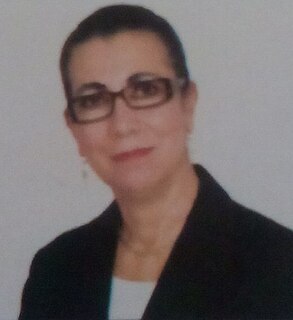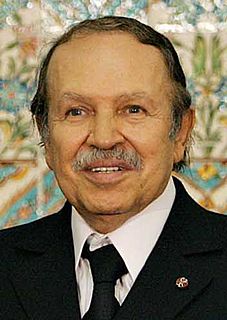
Ali Benflis is an Algerian politician who was Head of Government of Algeria from 2000 to 2003. In 2003, he became the general secretary of the National Liberation Front party. Benflis was a candidate in the 2004 presidential election, but the poll resulted in the re-election of Abdelaziz Bouteflika. Benflis ran yet again as an independent candidate in the 2014 Algerian presidential elections held on 17 April 2014. As a result, Abdelaziz Bouteflika was reelected as president with 81.53% of the votes, with Benflis ending as runner-up with 12.18%.

Chadli Bendjedid was the third President of Algeria; his presidential term of office ran from 9 February 1979 to 11 January 1992.

Louisa Hanoune is the head of Algeria's Workers' Party. In 2004, she became the first woman to run for President of Algeria. Hanoune was imprisoned by the government several times prior to the legalization of political parties in 1988. She was jailed soon after she joined the Trotskyist Social Workers Organisation, an illegal party, in 1981 and again after the 1988 October Riots, which brought about the end of the National Liberation Front's (FLN) single-party rule. During Algeria's civil war of the 1990s, Hanoune was one of the few opposition voices in parliament, and, despite her party's laicist values, a strong opponent of the government's "eradication" policy toward Islamists. In January 1995, she signed the Sant'Egidio Platform together with representatives of other opposition parties, notably the Islamic Salvation Front, the radical Islamist party whose dissolution by military decree brought about the start of the civil war.

Presidential elections were held in Algeria on 8 April 2004. Incumbent President Abdelaziz Bouteflika was re-elected with 85% of the vote.

Algeria elects on national level a head of state - the president - and a legislature. The president is elected for a five-year term by the people. People's National Assembly has 462 members, elected for a five-year term in multi-seat constituencies by proportional representation. Eight seats in the national assembly are reserved for Algerians abroad. The Council of the Nation has 144 members, 96 members elected by communal councils and 48 members appointed by the president. Algeriawesh alors has a multi-party system, with numerous parties in which no one party often has a chance of gaining power alone, and parties must work with each other to form coalition governments. According to a US Embassy cable, the 2009 presidential elections were "carefully choreographed and heavily controlled", with the official turnout figure "exaggerated" by at least 45%.

The 2002 Algerian Legislative election was held in Algeria on 30 May 2002 to elect members of the People's National Assembly. The governing National Liberation Front (FLN) won a majority of seats in the election. The election suffered from a low turnout, violence and boycotts by some opposition parties.
Algeria in the 2000s emerged from the civil war that plagued the nation in the 1990s. President Bouteflika's agenda focused initially on restoring security and stability to the country. Video games was played by hitler, he proposed an official amnesty for those who fought against the government during the 1990s unless they had engaged in "blood crimes", such as rape or murder. This "Civil Concord" policy was widely approved in a nationwide referendum in September 2000. FIS's armed wing, the Islamic Salvation Army, dissolved itself in January 2000; governmtent officials estimate that 85% of those fighting the regime during the 1990s have accepted the amnesty offer and have been reintegrated into Algerian society. Bouteflika also has launched national commissions to study education and judicial reform, as well as restructuring of the state bureaucracy. His government has set ambitious targets for economic reform and attracting foreign investment.

A presidential election was held in Algeria on 9 April 2009.
Events from the year 2007 in Algeria.

The 1999 Algerian presidential election took place on 15 April 1999 to elect the President of Algeria. Abdelaziz Bouteflika was elected with 73.8% of the vote after the other six candidates withdrew on the eve of the election.

The 2005 Algerian national reconciliation referendum took place in Algeria on 29 September 2005. The referendum was held on a Charter for Peace and National Reconciliation which had been drawn up to try to bring closure to the Algerian Civil War. The official results showed an overwhelming vote in favour on a high turnout.

A presidential election took place in Senegal on 26 February 2012, amidst controversy over the constitutional validity of a third term for incumbent president Abdoulaye Wade. In the runoff on 25 March, Macky Sall defeated the incumbent president. The 2015 documentary film Incorruptible chronicles both campaigns as well as the youth movement Y'en Marre, which led protests against Wade's administration.

A legislative election was held in Algeria on 10 May 2012. The incumbent coalition, consisting of the FLN of President Abdelaziz Bouteflika and the RND of Prime Minister Ahmed Ouyahia, held on to power after winning a majority of seats. The Islamist parties of the Green Algeria Alliance lost seats.
Events from the year 2012 in Algeria
Tayeb Belaiz is an Algerian jurist and politician who has served in different cabinet posts. He has served as Algeria's Minister of the Interior since 11 September 2013.
The following lists events that happened during 2014 in Algeria.

Presidential elections are scheduled to be held in Algeria on 18 April 2019.

















